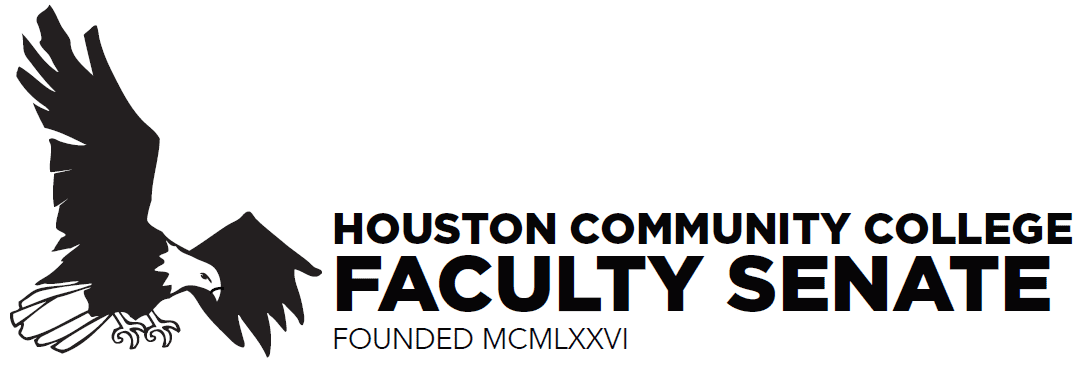CONSTITUTION
OF THE FACULTY ASSOCIATION
HOUSTON COMMUNITY COLLEGE
1999
Preamble
The accomplishment of the goals of any educational institution depends on the successful interaction of the administration, the faculty and the students. It is the faculty which carries out the institution’s primary function, the education of students, and it is the proximity to both students and administration which puts the faculty in an advantageous position to assess student and institutional needs. Therefore, it is prudent and necessary that the faculty play a role in the planning, policy-making, and decision-making processes of that institution.
In order to best address the needs of the students, the faculty and the administration of the institution, it is essential that faculty members be involved and informed. In order to promote faculty participation in the planning, policy-making and decision-making processes of the institution, a constitution is herein established for a Faculty Association.
ARTICLE I – Name
The name of this organization shall be the Houston Community College System Faculty Association, hereinafter referred to as the “Faculty Association.”
ARTICLE II- Purposes
The purposes of the Houston Community College System Faculty Association shall be to represent the interests of the faculty in their- relations with the administration and the Board of Trustees of H.C.C.S; to serve as a forum for the exchange of ideas and information; to provide opportunities for professional growth and development among the faculty; and to provide for active participation in the planning, policy-making and decision-making processes of the institution.
ARTICLE III- Membership
Section 1. – Regular. All employees on a faculty pay scale will be regular members of the Faculty Association.
Section 2. – Honorary. Persons who have contributed significantly to the Faculty Association but who are not eligible for membership may be voted honorary membership by majority vote of Senate. An honorary member will be entitled to all privileges of membership except those of voting and of holding office.
ARTICLE IV – Dues
No dues will be assessed for purposes of membership in the Faculty Association.
ARTICLE V – Faculty Senate
Section 1. – Name. The name of the council of representatives of the Faculty Association will be the Faculty Senate
Section 2. – Purposes. The purpose of the Faculty Senate is to provide the means by which Faculty Association members can participate in the planning, policy-making and decision-making processes of the college.
ARTICLE VI – Faculty Senate Members
Senate members will be elected by the members of the Faculty Association according to the procedure described in the bylaws. The duty of the Senate members is to represent the members of the Faculty Association.
In the event that a Senate member must be absent from a Faculty Senate meeting, the Senate member will designate a representative as an alternate.
ARTICLE VII- Officers
Section 1. The officers of the Faculty Association shall be the President, President-Elect, Vice-President, Secretary, Treasurer and the Immediate Past President. These officer, along with other officers that the Faculty Senate shall designate, constitute the Executive Committee.
Section 2. – Election. Officers of the Faculty Association will be elected by and from the Senate members.
Section 3. – Term. Officers elected in the fall shall take office at the beginning of the fall semester. Their- term of office shall be for one twelve month academic year. A President-Elect who succeeds to the presidency will serve for the remainder of the term vacated and will thereafter serve as President for one full term.
Section 4. – Vacancies. In the event of a vacancy in the office of the President, the President-Elect will succeed to the presidency. In the event of a vacancy in the office of President-Elect, the Senate by a majority vote shall fill the vacancy from its membership. In the event both the offices of the President and of the President-Elect become vacant, the Vice-President will serve as acting President until a special election can be held. This special election will be held within two months. In the event of a vacancy in the office of Vice-President, Secretary, or Treasurer, the President shall appoint an individual to fill the vacancy, subject to approval of the Senate. A vacancy in the office of the Immediate Past President shall remain unfilled.
ARTICLE VIII – Powers. Duties and Responsibilities of Officers
Section 1. – President. The President will be the presiding officer at all meetings and will be the spokesperson for the Faculty Association in official business with the administration and Board of Trustees. The President will edit and approve all formal communications and statements of policy issued in the name of the Faculty Association and the Faculty Senate.
Section 2. – President-Elect. The President-Elect will preside over meetings of the Faculty Senate, and of the Executive Committee in the absence of the President. The President-Elect will assist the President as needed. The President-Elect will direct his/her efforts toward the development of an adequate understanding of the activities of the Faculty Association in order to provide continuity of those activities during his/her term as President.
Section 3. – Vice-President. The Vice-President will assume general responsibility for appropriate publicity for the monthly meetings and will be responsible for supervising the apportionment of delegates to the Faculty Senate among the colleges of HCCS. The Vice-President shall preside over Senate meetings and Executive Committee meetings in the absence of both the President and President-Elect.
Section 4. – Secretary. The Secretary will be responsible for maintaining accurate minutes of the meetings and for distributing copies of the minutes or other records of the official proceedings of the Senate and/or the Executive Committee. The Secretary will maintain a file of minutes, correspondence, policy decisions, committee reports and other records of the Senate for the duration of his/her term of office, and turn over these files to the archives at the end of his/her term of office.
Section 5. – Treasurer. The Treasurer will keep financial records of the Senate and will give a monthly financial report at each regular meeting. The Treasurer shall be the chairperson of the Finance Committee which will prepare and present an annual budget report to the Executive Committee.
Section 6. – Immediate Past President. The Immediate Past President will provide advice and counsel concerning the operation and the activities of the Senate and will serve as a member of the Executive Committee.
Section 7. – Appointed Officers.
Part 1 The President may appoint a Parliamentarian, subject to approval by the Executive Committee, to advise the President and other officers, committees, and members on matters of parliamentary procedure.
Part 2 The President may appoint an Archivist, subject to the approval of the Executive Committee, to maintain the historical records of the Senate.
Part 3 The President may appoint any other officer he/she deems necessary for the organization and management of the Senate, subject to approval of the Executive Committee.
Part 4 Appointed officers will serve a term corresponding to that of the President who appointed them. Appointed officers are not members of the Executive Committee.
ARTICLE IX – Committees
Section 1. – Executive Committee. The Executive Committee will consist of the President, the President-Elect, the Vice-President, the Secretary, the Treasurer, and the Immediate Past President, and any other officer appointed by the Faculty Senate. The Executive Committee will exercise general managerial authority and responsibility over the activities of the Senate. It will carry out policies of the Senate consistent with the Constitution and the bylaws. It will confirm Presidential appointments and carry out any other responsibilities as may be directed by the membership of the Senate.
Section 2. – The President will appoint other standing, special, or ad hoc committees as is customary or as may be deemed necessary for the conduct of the business of the Senate.
Section 3. – President as ex-officio member. The President will be a member ex-officio of all standing, special, and ad hoc committees of the Senate.
ARTICLE X. – Faculty Senate Meetings
The first regular Senate meeting will be called within the first four weeks following the beginning of the fall semester, the time and place to be designated by the President of the Senate.
All other Senate meetings will be held at times and places to be announced by the President at the first meeting. Emergency meetings may be called by the President, as needed, with 24 hours notice.
Official business of the Senate will be conducted by the officers and Senate members present.
When not otherwise provided, Robert’s Rules of Order (newly revised) will govern parliamentary procedure.
Senate meetings are open to all members of the Faculty Association; however, voting privileges are reserved for Senate members only. Amendments to the Constitution are an exception to this rule and are considered the business of the entire Faculty Association membership.
ARTICLE XI – Amending the Constitution
Section 1. – An amendment to this Constitution will be proposed by written petition of at least 25 Faculty Association members, which must be submitted to the President. This amendment will be printed and distributed to the Faculty Association membership.
Section 2. – For purposes of discussion, debate, or revision, the proposed constitutional amendment will be considered at the next meeting of the Senate after submission of the amendment petition, to be held at least one month following initial printing and distribution to the Faculty Association membership.
Section 3. – The proposed amendment, in the form it emerges from the meeting defined in Section 2, will be voted on at the next regular Senate meeting after submission of the amendment, to be held within one month following printing in its final form. Passage will be by a 2/3 vote of the Faculty Association members present and voting.
ARTICLE XII. – Bylaws
The Senate shall have the authority to make its own bylaws for the conduct of its business. Bylaws will voted on by Senate members at the regular Senate meeting.

